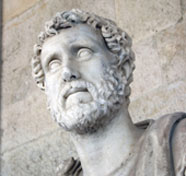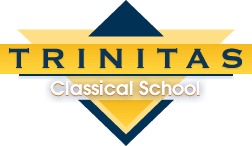What is Classical Education?
 At Trinitas Classical School, we believe that a classical education is one of the best ways to cultivate a student’s God-given desire to learn. A classical education follows the Trivium (Latin for “the three ways”). At each of the stages of the Trivium, the student’s natural inclination to pursue knowledge is celebrated and guided in appropriate and highly effective ways.
At Trinitas Classical School, we believe that a classical education is one of the best ways to cultivate a student’s God-given desire to learn. A classical education follows the Trivium (Latin for “the three ways”). At each of the stages of the Trivium, the student’s natural inclination to pursue knowledge is celebrated and guided in appropriate and highly effective ways.
In the Grammar stage (K-4), students’ abounding curiosity equips them to absorb and be able to recall astounding amounts of information. Through chants, songs, stories, recitations, oral presentations, and hands-on inquiry, they discover the truths about the world around them. Grammar students learn the rules of phonics, spelling, English and Latin grammar; how to compose a paragraph; the stories and events of the Bible, history, and classic literature; math facts and reasoning; descriptions of plants, animals, human beings, and the earth.
 In the Logic stage (5-8), students’ natural inclination to inquire and to argue is directed toward productive and good ends. Through such things as the Socratic method, debate, and the study of logic, students are taught to discern truth. Logic students continue their study of Latin and begin Greek. They learn how to write essays, stories, and poetry; construct and evaluate arguments; compare and contrast events in the Bible and history or works of literature; employ mathematical reasoning; recognize the relations of cause and effect; and think scientifically.
In the Logic stage (5-8), students’ natural inclination to inquire and to argue is directed toward productive and good ends. Through such things as the Socratic method, debate, and the study of logic, students are taught to discern truth. Logic students continue their study of Latin and begin Greek. They learn how to write essays, stories, and poetry; construct and evaluate arguments; compare and contrast events in the Bible and history or works of literature; employ mathematical reasoning; recognize the relations of cause and effect; and think scientifically.
 Finally, in the Rhetoric stage (7-8+), students’ natural desire for self-expression is directed in an even deeper way toward those things which are noble, right, pure, and lovely. Ample opportunities for essay writing and oratory help students learn not just to express themselves, but to express themselves well. Interaction with the finest and most beautiful of thought leads them not only to discern but also to desire truth. Rhetoric students continue Latin and Greek; read many of the great books often reserved for college-level students; discuss theology, politics, and ethics; write and defend theses; develop higher level mathematical reasoning; and design and report the findings of some of their own scientific experiments.
Finally, in the Rhetoric stage (7-8+), students’ natural desire for self-expression is directed in an even deeper way toward those things which are noble, right, pure, and lovely. Ample opportunities for essay writing and oratory help students learn not just to express themselves, but to express themselves well. Interaction with the finest and most beautiful of thought leads them not only to discern but also to desire truth. Rhetoric students continue Latin and Greek; read many of the great books often reserved for college-level students; discuss theology, politics, and ethics; write and defend theses; develop higher level mathematical reasoning; and design and report the findings of some of their own scientific experiments.
At Trinitas Classical School, we employ the riches of the Trivium to prepare students to discover, discern, and desire truth.

